- Home
- Ann M. Martin
Best Friends Page 2
Best Friends Read online
Page 2
“Hi, Nikki,” replied the teacher on playground duty. “Your mother called this morning and said you and Tobias would be picking up Mae today. She’s all ready to go. There’s her backpack.”
“Nikki! Nikki!” cried Mae then, righting herself before throwing her arms around her big sister.
Later, as Tobias drove them along the country roads outside of Camden Falls, Mae reported cheerfully from her spot in the backseat, “In school we learned about fish today, and then at day care we learned a song about fish. I don’t know if I remember all the words, but here, listen: ‘Down in the meadow in an itty-bitty poo fam fee itty fitties and their mama fitty, too. “Fim!” said the mama fitty. “Fim if you can —”’”
“Excuse me, what?” said Tobias.
“I’m not sure what it means, either,” Mae admitted, “but our teacher said it’s about fish, and it’s really fun to sing. Later you get to say, ‘Boop, boop, dittum, dattum, wattum, CHOO!’ a lot of times.”
Tobias turned off the road and onto the lane that led to the Shermans’ house. Nikki opened her window. “Ahh,” she said. “Smells good. Flora got caught daydreaming in school this afternoon because our door was open and it was practically summer out.”
“It’s summer?” said Mae.
“Not really. It’s still early spring,” Nikki replied. “But it smells like summer today.”
“Can we walk to the Shaws’ farm?” asked Mae.
“Maybe this weekend,” said Tobias.
Nikki breathed in the smells of damp earth and new green shoots, of things growing and changing and emerging. She wished her yard looked like Flora and Ruby’s or Olivia’s, wished it looked like most of the yards in town. She imagined green lawns and flower beds and rambling rock walls. She imagined wide front porches, some with swings. She looked at her house. The wooden steps had recently grown crooked. The paint was peeling faster than ever. And the yard — well, there wasn’t really a yard at all. Just packed earth and small ramshackle buildings and the burning pit. Nikki sighed.
Her father had left home four months earlier, soon after Thanksgiving, supposedly to take a job somewhere in the South. He left with grudging promises to write and send money. Neither letters nor cash had arrived, although Mr. Sherman himself had returned briefly at Christmastime. He’d stayed just long enough to horrify and frighten all the Shermans, and then Tobias, enraged, had thrown his father out of the house.
“He won’t come back now,” Mrs. Sherman had said that night. “He’s humiliated.”
Nikki hoped that was true — but with her father, you never knew.
Tobias parked the car and Nikki stepped out, then helped Mae with her backpack.
“This weighs a ton,” she said. “What’s in here? Rocks?”
“No,” said Mae, giggling. “We cleaned out our desks.”
Nikki peeked in the backpack. “You had sneakers in your desk? And … where did all these books come from?”
“From my teacher,” Mae replied. “She let me borrow them. I have to — hey, Nikki! Tobias! Look!”
Nikki turned her head in the direction Mae was pointing. At the edge of the property, where the shrubs and bushes formed a sloppy divider between their yard and the south side of the Shaws’ land, sat two skinny dogs.
Nikki considered them. “Well …” she said.
“Can we feed them?” asked Mae. “Can we keep them?”
“We definitely can’t keep them,” said Tobias.
“But we can feed them until the people from Sheltering Arms come out here again,” said Nikki.
Stray dogs were always showing up in the Shermans’ yard. Nikki supposed they roamed the countryside, dogs that were lost or abandoned or feral. She and Mae used to feed them, but eventually so many came by for meals that Nikki could no longer afford their food. Finally, Tobias had taken her to the animal shelter, and the people there had started coming by to trap the stray dogs (humanely) and find homes for them.
“Maybe we could keep just one of them,” said Mae, turning hopeful eyes to her brother and sister.
“Nope. Can’t afford it,” said Tobias.
“Besides, what would Paw-Paw think?” asked Nikki.
“That he had a new friend?” said Mae, but she didn’t press the point. She ran ahead of Tobias and Nikki and threw her arms around Paw-Paw, the Shermans’ only pet, who himself had once been one of the stray dogs.
By the time Mrs. Sherman returned from work, Tobias had started supper and Nikki had started her homework, having first listened to Mae do her fifteen minutes of reading aloud.
“I’m exhausted!” exclaimed Mrs. Sherman, tossing her coat and handbag on the couch, then flopping onto a chair at the kitchen table.
Nikki regarded her mother seriously. “How long do you think you can keep this up?”
“Keep what up?”
“Two jobs.”
“I don’t know.”
For two months now, Mrs. Sherman had been working both as a cashier at the new grocery store in Camden Falls and as a waitress at Fig Tree, the fancy restaurant on Main Street. Tobias worked, too, after school and on weekends. The Shermans were getting by, but just barely.
“I’m trying to find a new job,” said Mrs. Sherman, and by this she meant a full-time job with better pay and better hours, “but it’s hard to job hunt when I’m working.”
“Well,” said Tobias, who by now had called Mae to the table and filled everyone’s plates, “when school ends and I graduate, I can help by getting a full-time job.”
Nikki eyed her mother and wasn’t surprised when Mrs. Sherman said, “That’s very nice, honey. I really appreciate the thought. We all do. But you have your own life to live. I don’t want you to feel you have to help support us. Not after you graduate. Speaking of which, what about college?”
Tobias looked up with his mouth full. “What?”
“College,” his mother repeated. “I know we should have been thinking about this, um, years ago, actually, but there were always so many other …” Her voice trailed off.
“It’s okay, Mom,” said Tobias.
“No, it isn’t. And now that I’m in charge around here” (Mrs. Sherman glanced at Mr. Sherman’s empty chair), “I intend to do things differently. I have different goals for you kids. I always have.” She paused. “Anyway, you graduate in June, and then wouldn’t you like to go to college?”
“How would that be possible?” asked Tobias. “We can’t afford it. I haven’t even applied anywhere.”
Mrs. Sherman put her fork down. “There are ways to do everything.”
“You wanted to go to college, didn’t you, Mom?” asked Nikki, who very much wanted to go to college herself one day.
“Yes. And I’ve always regretted not going.”
“Maybe you could go to college now,” said Tobias, inspired. “Really, Mom. You always read stories about old people — I mean, people your age — who go back to school and get their college degrees.”
“Let’s concentrate on you first,” said his mother.
After the dishes had been washed and dried, Tobias went outside to one of the sheds in which he tinkered with complicated mechanical and electrical things that mystified Nikki, while Mrs. Sherman and Mae emptied Mae’s backpack and looked through the books her teacher had lent her. This gave Nikki the bedroom, the one she shared with her sister, all to herself for a solid hour. She sat at the scarred desk (bought three years ago at a garage sale) with Paw-Paw at her feet.
Nikki, one of the best students in Mr. Donaldson’s class, pulled out her battered notebook. She had every intention of writing the essay about summer before doing anything else, but when she opened her drawer to look for a pencil, her eyes fell on a sheaf of papers, and she pulled them out and smoothed them flat. Here were some of Nikki’s drawings from the previous summer — a sketch of a dragonfly, which now struck her as embarrassingly amateurish, but also a more finished drawing of a grasshopper, which she thought was quite good. Nikki planned to enter some of
her best drawings in the art exhibit that was to be a part of the Camden Falls birthday festivities. She threw away the dragonfly sketch but decided to add the grasshopper to her exhibit folder.
The exhibit folder sat on top of the desk, right out in the open. Nikki still marveled at this. Her father had frowned on her interest in art. In fact, he had not had very nice things to say about artists or about art as a profession. At the beginning of the school year, before Mr. Sherman had left, Nikki was still drawing in secret and had been able only to dream about the exhibit. Now she could draw whenever she felt the urge, and she could leave her work lying around the house without worrying about what her father might do to it. She had told Mr. Donaldson that she planned to enter three finished pieces in the exhibit in May. Still, sometimes when Nikki looked through the folder, a small part of her worried that her mother had been wrong; that maybe her father hadn’t been humiliated enough to leave for good. What if he came back again unexpectedly — for Mae’s birthday or Tobias’s high school graduation or for no reason at all?
Nikki considered hiding the folder, but the fact that thinking of her father made her want to do this angered her. She left the folder where it was and began her composition for Mr. Donaldson.
There was nothing, Olivia thought, like stepping through her front door and seeing the yards of the Row Houses spreading away in either direction up and down Aiken Avenue. The sight was especially good on a bright morning in the early spring. To her left were the yards belonging to the Fongs and the Edwardses and Mr. Pennington. The Fongs’ yard had recently been transformed from the traditional flower beds and grass to islands of stones, a reflecting pool, and some empty gardens that Mrs. Fong had told Olivia would soon be filled with nonflowering greens. Did Olivia know what ornamental grasses were? Olivia didn’t, but she liked the Fongs’ new look very much, so she thought she would like ornamental grasses as well.
The Fongs’ yard was empty of people on this early morning, as was the Edwardses’, but Mr. Pennington was sweeping his walk while Jacques dozed in the sun on the front stoop. Farther along, to Olivia’s right, old Mr. Willet was climbing into his car, and Olivia thought perhaps he was on his way to visit Mrs. Willet, who had Alzheimer’s and had recently moved to a nursing facility. At the far end of the row, the four Morris children were taking advantage of this unusually warm March Saturday to play noisily and vigorously in the grass, which was just beginning to lose its winter brown.
Olivia now leaned back into her house and called, “Henry! Jack! Come on! I want to go. Flora and Ruby are waiting for me.”
Presently, Olivia’s brothers, ages eight and six, thundered down the stairs and out the door. “All right,” said Olivia. “Now remember: Mom and Dad are going to be at the store all morning, so you’re going to stay with the Morrises. I’m going into town with Flora and Ruby.”
“Okay!” said Jack.
“Bye!” said Henry.
They ran across the lawns to the Morris kids, while at Min’s house, Flora fumbled for her key and Ruby called admonitions to Daisy Dear and King Comma, their cat, who, Olivia presumed, were standing on the other side of the front door.
“No fighting while we’re gone,” Ruby said. “Daisy, you’re in charge. King, no clawing the furniture.”
Olivia ran to her friends and soon they were walking toward Main Street.
“Do you think,” said Ruby, “that after Sincerely Yours opens you’ll get free candy anytime you want it?”
Olivia wrinkled her nose. “I don’t know. Anyway, I’m a little tired of candy. I like it, but Mom’s been making it at home for so long that it’s not exactly special anymore.”
Ruby sighed. “It would be for me. I wish I lived in Candyland.”
Olivia and Flora and Ruby passed Needle and Thread, waving vaguely toward the windows as they did so. A moment later, Flora exclaimed, “Hey, the sign is up!”
Sure enough, a long white sign with staid black letters spelling out SINCERELY YOURS had appeared over the door to the Walters’ store.
“Sweet,” said Ruby.
“It looks busy inside,” commented Flora.
Olivia opened the door. The store was still a mess, but perhaps not as messy as it had been a few weeks earlier. Plywood was stacked here and there, with paint cans, rags, rollers, toolboxes, sawhorses, ladders, and drop cloths arranged tidily along the walls.
Olivia’s parents were smiling.
“What do you think, girls?” Mr. Walter asked Flora and Ruby.
“It’s going to be beautiful,” said Flora politely.
“Where will the candy be?” asked Ruby, and Flora gave her a tiny pinch. When Ruby had an idea in her head, it was hard to get it out.
“We’ll be making it in the kitchen,” replied Mrs. Walter. “The kitchen is in the back, through that doorway. And we’ll be selling it here at the counter. The counter should be completed in about three weeks.”
“Guess what,” said Mr. Walter. “We think we might be able to have the grand opening just before the three hundred and fiftieth birthday party.”
“Really?” exclaimed Olivia. “Excellent!”
“What will you do for the grand opening?” asked Flora.
“We’re not sure yet,” said Mrs. Walter. “Some kind of party.”
“With free candy?” asked Ruby.
“Ruby!” said Flora in a loud whisper. “Stop!”
“It’s a fair question,” said Ruby.
“Yes, I believe there will be free candy,” said Mr. Walter.
The door to Sincerely Yours stood open on this warm day, and several people who were passing paused to peek inside. Then a voice called, “Hello, neighbors!” and Sheila from Heaven entered the store.
“I guess we are your neighbors, aren’t we?” said Mrs. Walter.
Min was the next to stop in. “It’s really coming along,” she said approvingly, surveying the space.
Three more visitors arrived, and Olivia heard Robby Edwards call cheerfully, “Hello! Hello, everyone! Hi, Olivia! Hi, Flora! Hi, Ruby! Hi —”
Mrs. Edwards took her son by the elbow and said gently, “I know this is exciting, Robby, but try to calm down.”
“But it’s a new store, Mom! Olivia’s store! A candy store! And more!”
“Robby.”
“Okay.” Robby Edwards, eighteen years old, stepped back through the door and stood outside for a few moments, breathing deeply. Olivia watched him through a clean spot on the window. Robby had Down syndrome and sometimes became overexcited. Now he entered the store again and whispered to Olivia, “It’s time for appropriate behavior.”
Mr. Walter was showing Mr. Edwards around the store. “We had to start all over with an entirely new kitchen,” he explained.
Robby waited patiently until Mr. Walter had finished the tour. Then he said, “Mr. and Mrs. Walter, I have to ask you a question. May I please apply for a job here? I graduate in June. Then I’m going to go to work. We’ve talked about it,” he added, glancing at his parents. “This is a serious decision.”
“It is indeed,” Mrs. Walter started to reply, but she was interrupted by Mrs. Edwards.
“We talked about your finding a job,” said Robby’s mother, “but not about applying for work here. You didn’t discuss that with us.”
“But I’m an adult now,” said Robby. “I have to start doing things on my own.”
Olivia looked at Mrs. Edwards, who was watching Robby with a mixture of fondness and sadness. “Robby, this is not the place for such a discussion,” she said gently.
“Excuse me,” was Robby’s reply. “Mrs. Walter, I’ve been learning about making change and stocking shelves and being polite to the customers and not shouting at people or crying if they say something I don’t like. Oh, and using my quiet voice. And I’m good at memorizing things. And also I can use a calculator.”
“That’s very impressive,” said Mr. Walter, who had joined Olivia’s mother. “The thing is, we haven’t thought much about who we’re going to
hire.”
“We were concentrating on finishing the renovations and planning the opening,” added Mrs. Walter.
“But it’s good to think ahead,” said Robby.
“You’re right,” agreed Mr. Walter. “I’ll tell you what — we’ll start doing that, and we’ll have an answer for you in a few weeks. Fair enough?”
“Fair enough,” replied Robby, and he strode out of the store ahead of his parents, hands in his pockets, face to the sun.
Olivia, Ruby, and Flora pulled three paint cans into a circle near the door and sat down on them.
“Isn’t it funny,” said Olivia, “how something that seems so bad can turn out to be so good?”
“What do you mean?” asked Ruby.
“When my dad lost his job it seemed — well, not like the end of the world, but pretty bad. I didn’t know what was going to happen — whether we might have to move or something — and then Dad couldn’t decide what he wanted to do. Now he and Mom are opening their own store, and they seem so excited. Dad never looked excited when he left for the office in the morning. And I’m going to get to help out in the store, and now maybe Robby will get a job here. I don’t know if that will actually happen, but still.”
“And you’ll have the grand opening in just two months,” said Flora.
“Hey, Annika will be here then!” exclaimed Ruby. “She’ll get to see the store.”
And just like that, Olivia felt her mood darken.
“You guys are going to like each other so, so much,” Flora promised.
Olivia said nothing.
“Remember the time Annika made the treasure hunt in her attic?” Ruby asked, and Flora grinned. “She was always thinking up good ideas like that,” Ruby continued. “Her birthday is in July, and two years ago she had a summertime Christmas party. We sang Christmas carols and made Christmas decorations.”
“It was ninety-five degrees outside,” said Flora.
“And once,” Ruby went on, “she set up a fortune-telling stand in her front yard. I played Madame Zaroka, her helper.”
“I took in the money,” Flora told Olivia. “We made eleven dollars.”

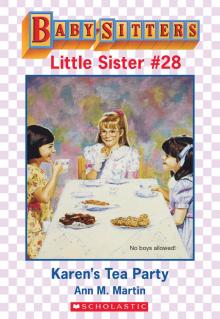 Karen's Tea Party
Karen's Tea Party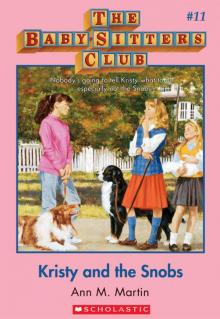 Kristy and the Snobs
Kristy and the Snobs Best Kept Secret
Best Kept Secret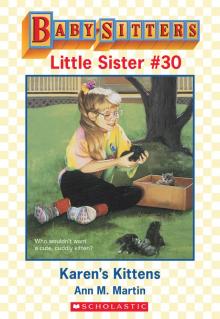 Karen's Kittens
Karen's Kittens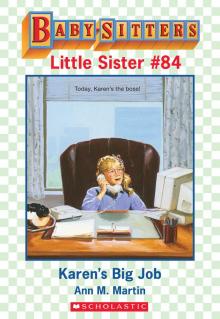 Karen's Big Job
Karen's Big Job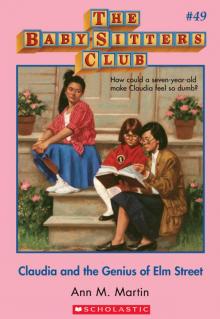 Claudia and the Genius of Elm Street
Claudia and the Genius of Elm Street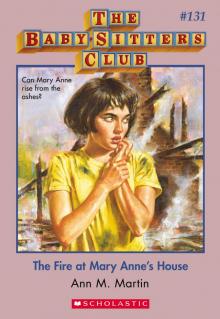 The Fire at Mary Anne's House
The Fire at Mary Anne's House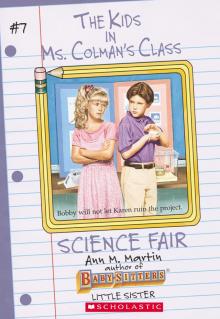 Science Fair
Science Fair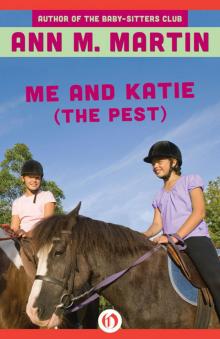 Me and Katie (The Pest)
Me and Katie (The Pest)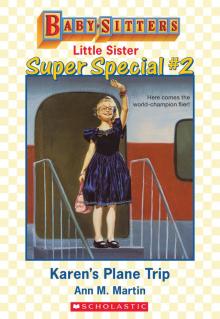 Karen's Plane Trip
Karen's Plane Trip Jessi's Wish
Jessi's Wish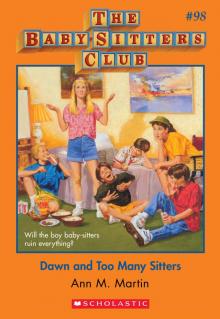 Dawn and Too Many Sitters
Dawn and Too Many Sitters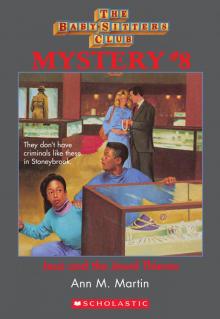 Jessi and the Jewel Thieves
Jessi and the Jewel Thieves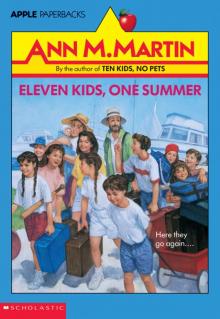 Eleven Kids, One Summer
Eleven Kids, One Summer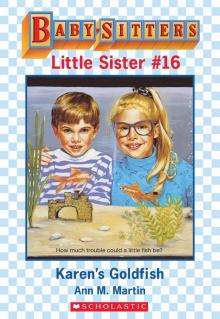 Karen's Goldfish
Karen's Goldfish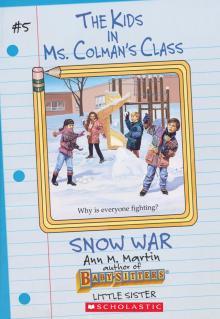 Snow War
Snow War Abby and the Secret Society
Abby and the Secret Society Keeping Secrets
Keeping Secrets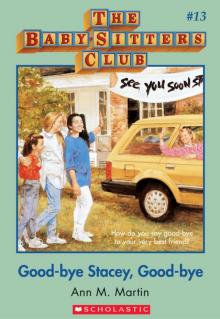 Good-Bye Stacey, Good-Bye
Good-Bye Stacey, Good-Bye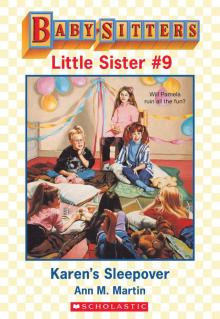 Karen's Sleepover
Karen's Sleepover Claudia and the World's Cutest Baby
Claudia and the World's Cutest Baby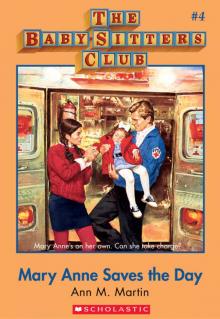 Mary Anne Saves the Day
Mary Anne Saves the Day Mallory and the Dream Horse
Mallory and the Dream Horse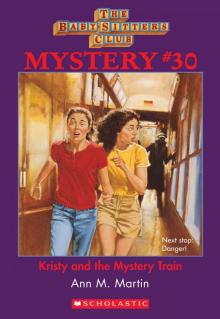 Kristy and the Mystery Train
Kristy and the Mystery Train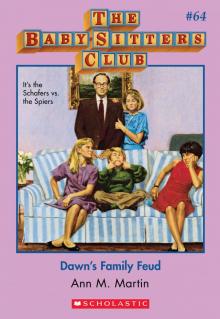 Dawn's Family Feud
Dawn's Family Feud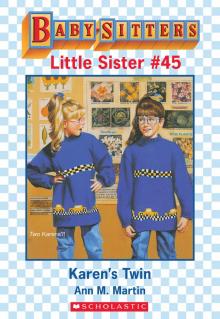 Karen's Twin
Karen's Twin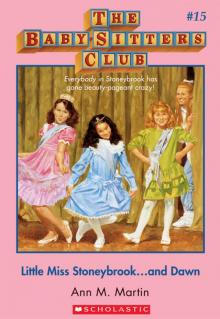 Little Miss Stoneybrook... And Dawn
Little Miss Stoneybrook... And Dawn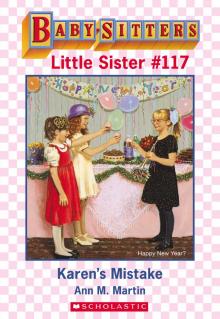 Karen's Mistake
Karen's Mistake Karen's Movie Star
Karen's Movie Star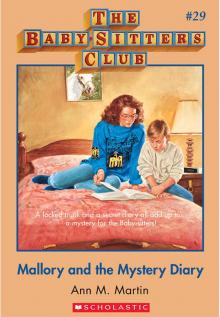 Mallory and the Mystery Diary
Mallory and the Mystery Diary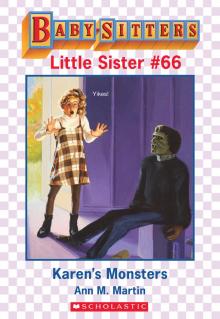 Karen's Monsters
Karen's Monsters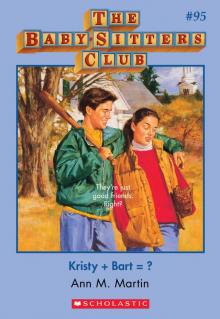 Kristy + Bart = ?
Kristy + Bart = ?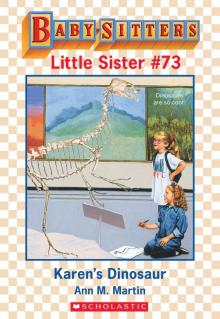 Karen's Dinosaur
Karen's Dinosaur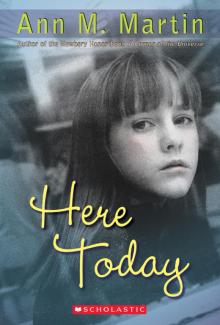 Here Today
Here Today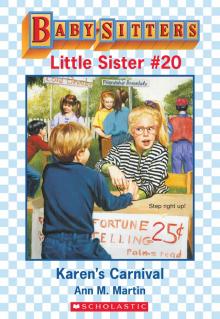 Karen's Carnival
Karen's Carnival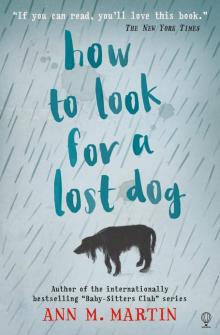 How to Look for a Lost Dog
How to Look for a Lost Dog Stacey vs. Claudia
Stacey vs. Claudia Stacey's Ex-Boyfriend
Stacey's Ex-Boyfriend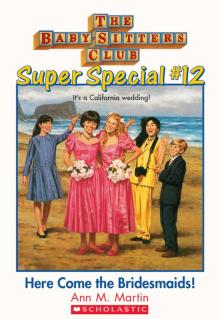 Here Come the Bridesmaids!
Here Come the Bridesmaids! Graduation Day
Graduation Day Kristy's Big News
Kristy's Big News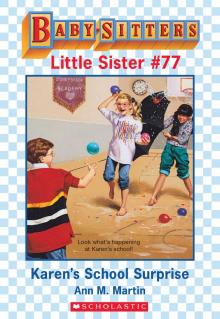 Karen's School Surprise
Karen's School Surprise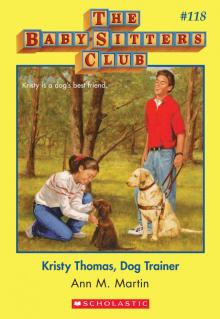 Kristy Thomas, Dog Trainer
Kristy Thomas, Dog Trainer Baby-Sitters' Christmas Chiller
Baby-Sitters' Christmas Chiller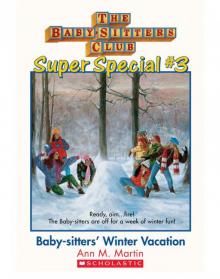 Baby-Sitters' Winter Vacation
Baby-Sitters' Winter Vacation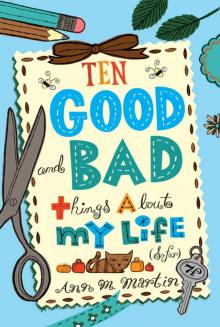 Ten Good and Bad Things About My Life
Ten Good and Bad Things About My Life Claudia and the Bad Joke
Claudia and the Bad Joke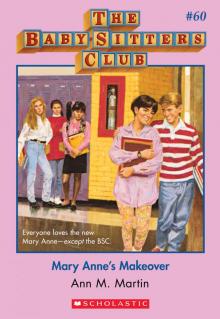 Mary Anne's Makeover
Mary Anne's Makeover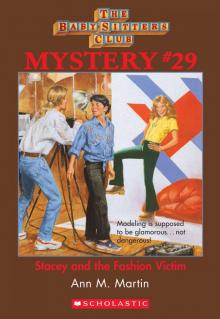 Stacey and the Fashion Victim
Stacey and the Fashion Victim Dawn Schafer, Undercover Baby-Sitter
Dawn Schafer, Undercover Baby-Sitter Karen's Tuba
Karen's Tuba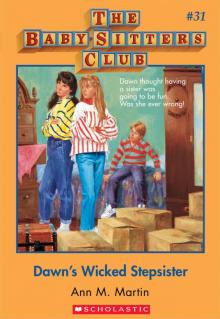 Dawn's Wicked Stepsister
Dawn's Wicked Stepsister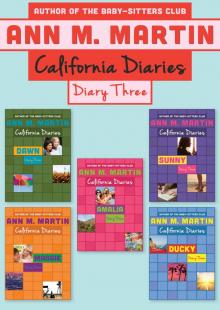 Diary Three: Dawn, Sunny, Maggie, Amalia, and Ducky
Diary Three: Dawn, Sunny, Maggie, Amalia, and Ducky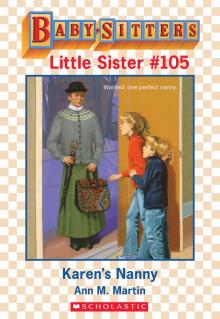 Karen's Nanny
Karen's Nanny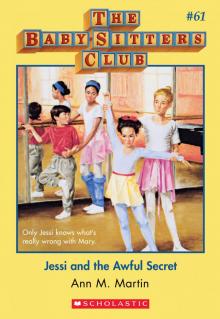 Jessi and the Awful Secret
Jessi and the Awful Secret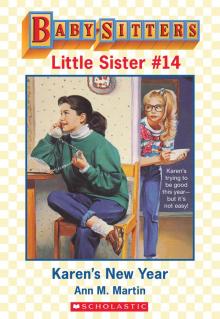 Karen's New Year
Karen's New Year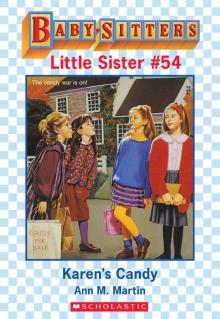 Karen's Candy
Karen's Candy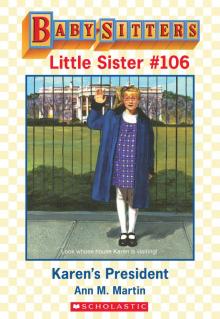 Karen's President
Karen's President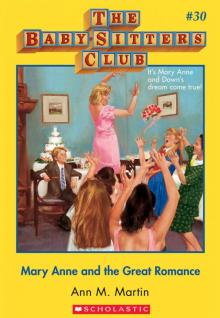 Mary Anne and the Great Romance
Mary Anne and the Great Romance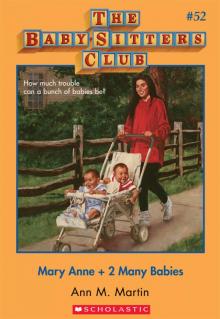 Mary Anne + 2 Many Babies
Mary Anne + 2 Many Babies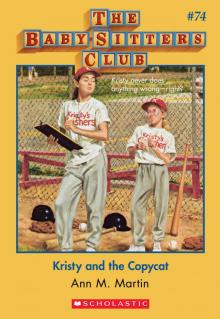 Kristy and the Copycat
Kristy and the Copycat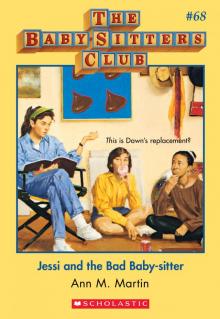 Jessi and the Bad Baby-Sitter
Jessi and the Bad Baby-Sitter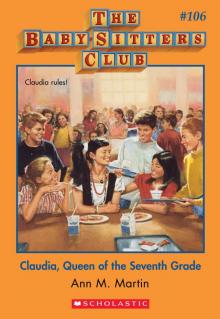 Claudia, Queen of the Seventh Grade
Claudia, Queen of the Seventh Grade Claudia and the Lighthouse Ghost
Claudia and the Lighthouse Ghost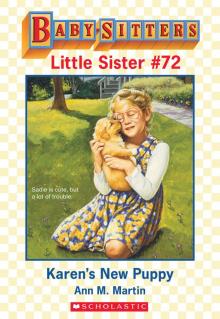 Karen's New Puppy
Karen's New Puppy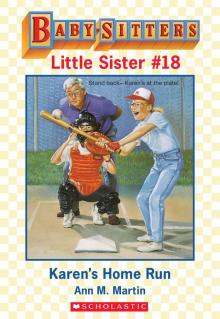 Karen's Home Run
Karen's Home Run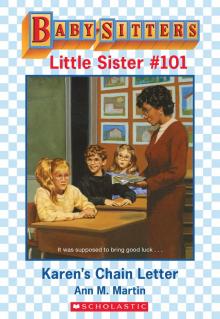 Karen's Chain Letter
Karen's Chain Letter Kristy in Charge
Kristy in Charge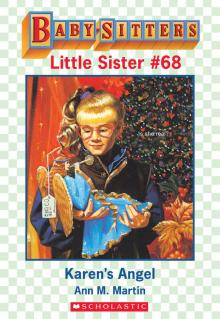 Karen's Angel
Karen's Angel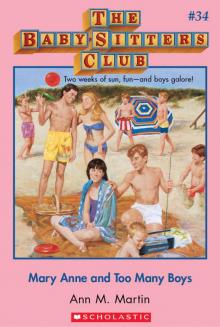 Mary Anne and Too Many Boys
Mary Anne and Too Many Boys Karen's Big Fight
Karen's Big Fight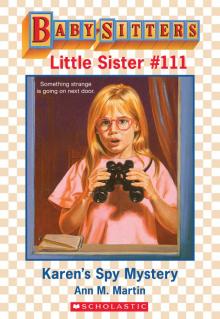 Karen's Spy Mystery
Karen's Spy Mystery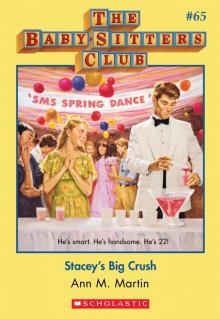 Stacey's Big Crush
Stacey's Big Crush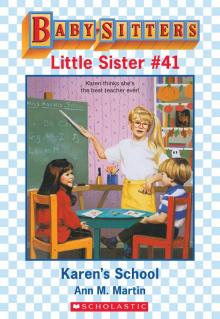 Karen's School
Karen's School Claudia and the Terrible Truth
Claudia and the Terrible Truth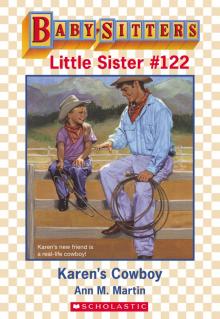 Karen's Cowboy
Karen's Cowboy The Summer Before
The Summer Before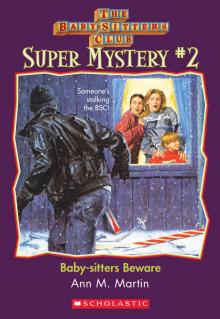 Beware, Dawn!
Beware, Dawn! Belle Teale
Belle Teale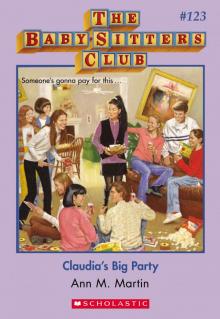 Claudia's Big Party
Claudia's Big Party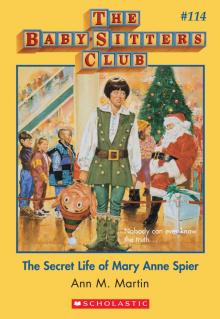 The Secret Life of Mary Anne Spier
The Secret Life of Mary Anne Spier Karen's Book
Karen's Book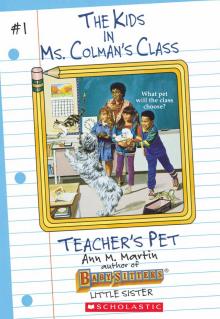 Teacher's Pet
Teacher's Pet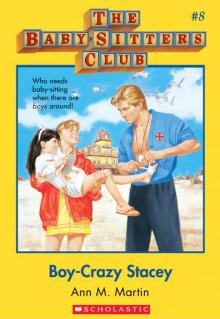 Boy-Crazy Stacey
Boy-Crazy Stacey Claudia and the Disaster Date
Claudia and the Disaster Date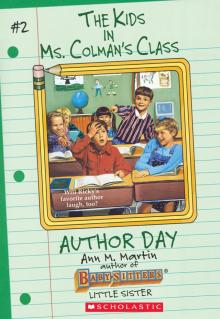 Author Day
Author Day Claudia and the Sad Good-Bye
Claudia and the Sad Good-Bye Kristy and the Worst Kid Ever
Kristy and the Worst Kid Ever Yours Turly, Shirley
Yours Turly, Shirley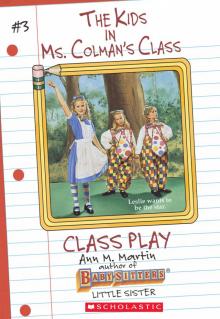 Class Play
Class Play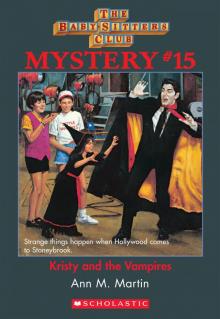 Kristy and the Vampires
Kristy and the Vampires Kristy and the Cat Burglar
Kristy and the Cat Burglar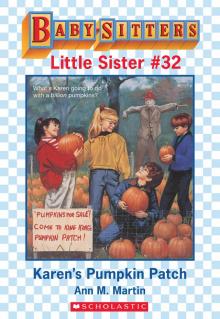 Karen's Pumpkin Patch
Karen's Pumpkin Patch Stacey and the Mystery at the Empty House
Stacey and the Mystery at the Empty House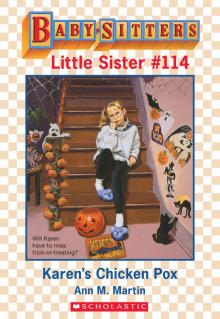 Karen's Chicken Pox
Karen's Chicken Pox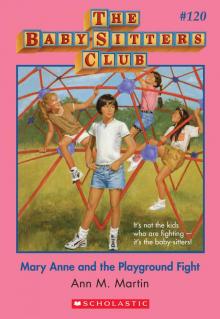 Mary Anne and the Playground Fight
Mary Anne and the Playground Fight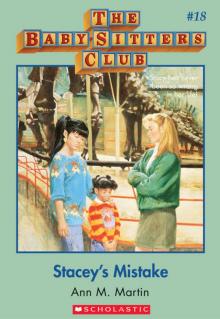 Stacey's Mistake
Stacey's Mistake Coming Apart
Coming Apart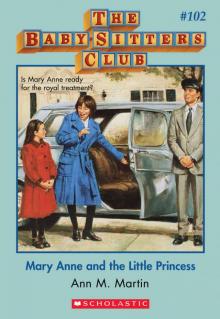 Mary Anne and the Little Princess
Mary Anne and the Little Princess Karen, Hannie and Nancy: The Three Musketeers
Karen, Hannie and Nancy: The Three Musketeers 'Tis the Season
'Tis the Season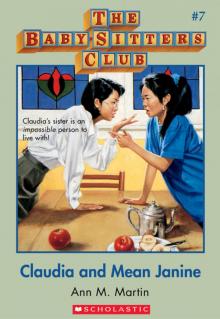 Claudia and Mean Janine
Claudia and Mean Janine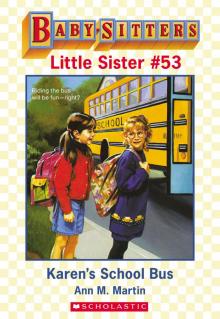 Karen's School Bus
Karen's School Bus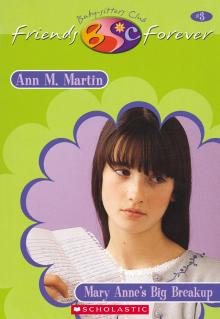 Mary Anne's Big Breakup
Mary Anne's Big Breakup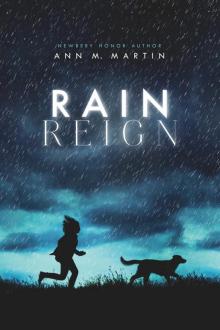 Rain Reign
Rain Reign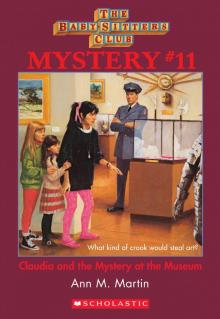 Claudia and the Mystery at the Museum
Claudia and the Mystery at the Museum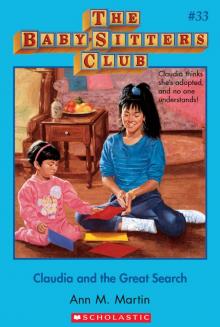 Claudia and the Great Search
Claudia and the Great Search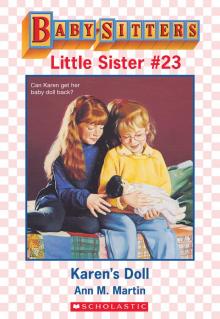 Karen's Doll
Karen's Doll Shannon's Story
Shannon's Story Sea City, Here We Come!
Sea City, Here We Come!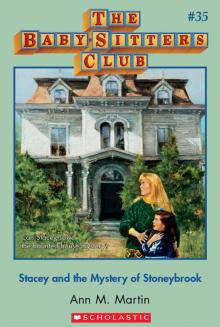 Stacey and the Mystery of Stoneybrook
Stacey and the Mystery of Stoneybrook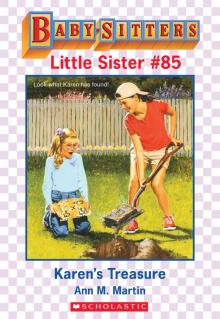 Karen's Treasure
Karen's Treasure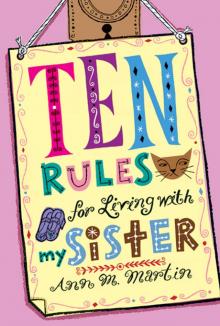 Ten Rules for Living With My Sister
Ten Rules for Living With My Sister With You and Without You
With You and Without You Baby-Sitters' Island Adventure
Baby-Sitters' Island Adventure Karen's Fishing Trip
Karen's Fishing Trip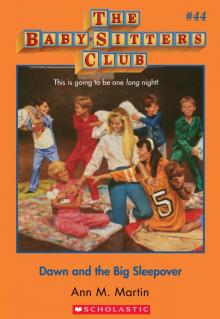 Dawn and the Big Sleepover
Dawn and the Big Sleepover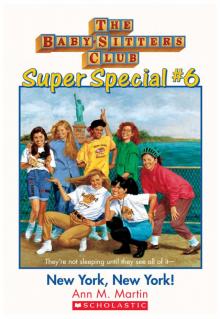 New York, New York!
New York, New York! Ten Kids, No Pets
Ten Kids, No Pets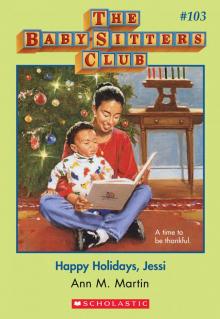 Happy Holidays, Jessi
Happy Holidays, Jessi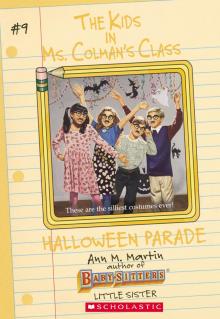 Halloween Parade
Halloween Parade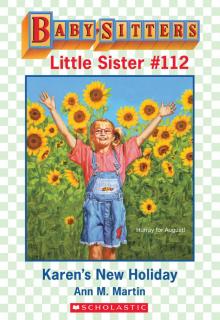 Karen's New Holiday
Karen's New Holiday Kristy Power!
Kristy Power! Karen's Wish
Karen's Wish Claudia and the Mystery in the Painting
Claudia and the Mystery in the Painting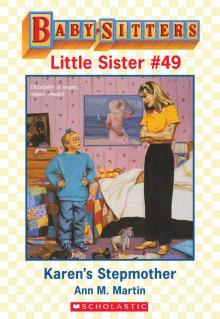 Karen's Stepmother
Karen's Stepmother Abby in Wonderland
Abby in Wonderland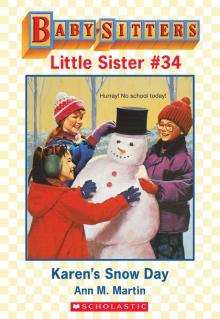 Karen's Snow Day
Karen's Snow Day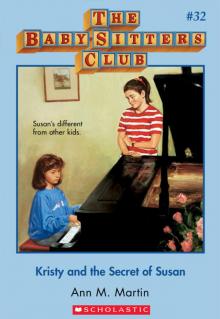 Kristy and the Secret of Susan
Kristy and the Secret of Susan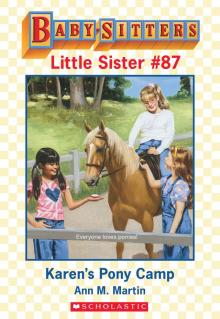 Karen's Pony Camp
Karen's Pony Camp Karen's School Trip
Karen's School Trip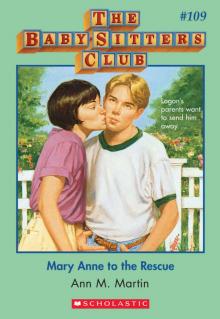 Mary Anne to the Rescue
Mary Anne to the Rescue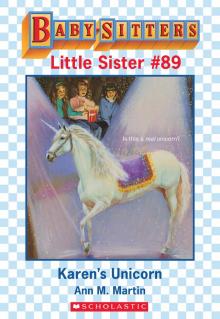 Karen's Unicorn
Karen's Unicorn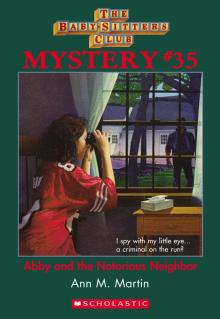 Abby and the Notorious Neighbor
Abby and the Notorious Neighbor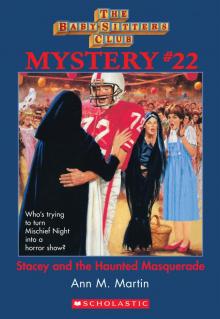 Stacey and the Haunted Masquerade
Stacey and the Haunted Masquerade Claudia Gets Her Guy
Claudia Gets Her Guy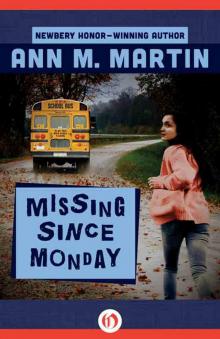 Missing Since Monday
Missing Since Monday Stacey's Choice
Stacey's Choice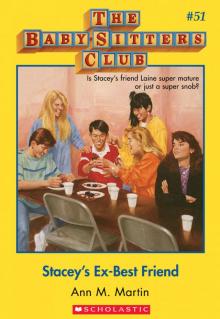 Stacey's Ex-Best Friend
Stacey's Ex-Best Friend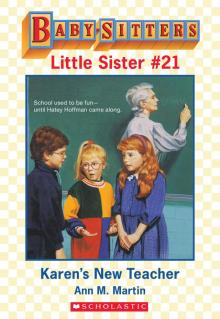 Karen's New Teacher
Karen's New Teacher Karen's Accident
Karen's Accident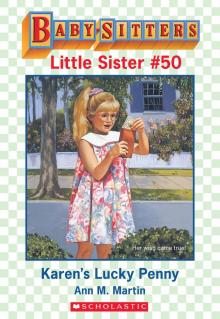 Karen's Lucky Penny
Karen's Lucky Penny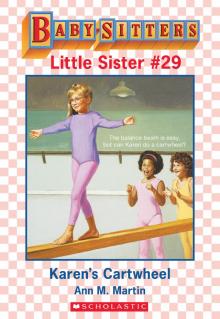 Karen's Cartwheel
Karen's Cartwheel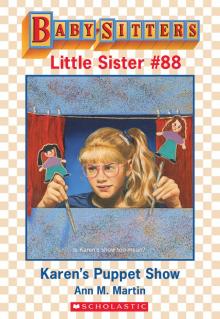 Karen's Puppet Show
Karen's Puppet Show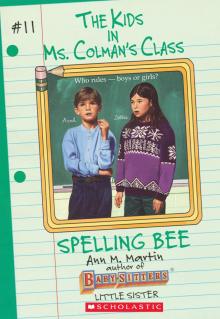 Spelling Bee
Spelling Bee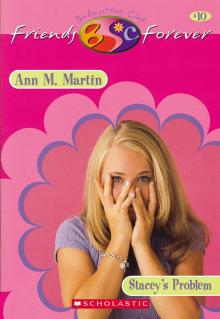 Stacey's Problem
Stacey's Problem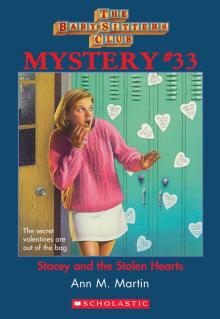 Stacey and the Stolen Hearts
Stacey and the Stolen Hearts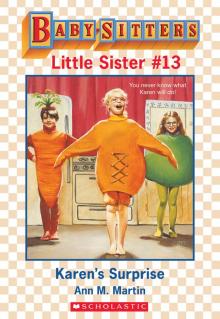 Karen's Surprise
Karen's Surprise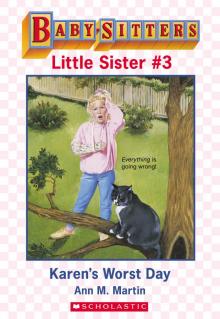 Karen's Worst Day
Karen's Worst Day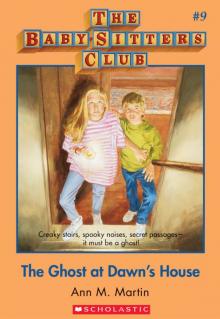 The Ghost at Dawn's House
The Ghost at Dawn's House Karen's Big Sister
Karen's Big Sister Karen's Easter Parade
Karen's Easter Parade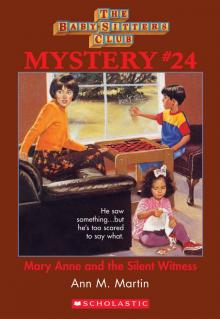 Mary Anne and the Silent Witness
Mary Anne and the Silent Witness Karen's Swim Meet
Karen's Swim Meet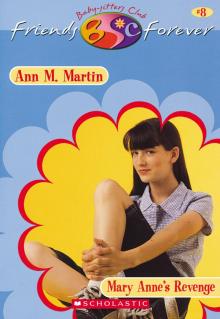 Mary Anne's Revenge
Mary Anne's Revenge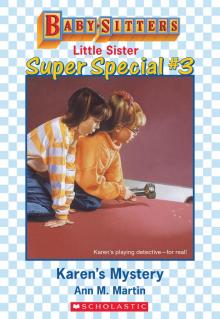 Karen's Mystery
Karen's Mystery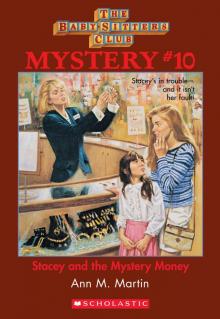 Stacey and the Mystery Money
Stacey and the Mystery Money Dawn and the Disappearing Dogs
Dawn and the Disappearing Dogs Karen's Christmas Tree
Karen's Christmas Tree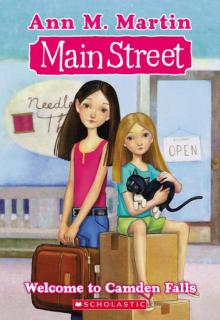 Welcome to Camden Falls
Welcome to Camden Falls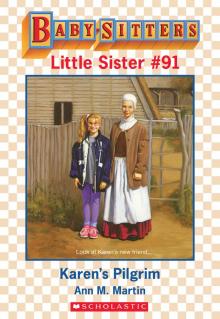 Karen's Pilgrim
Karen's Pilgrim Dawn and the Halloween Mystery
Dawn and the Halloween Mystery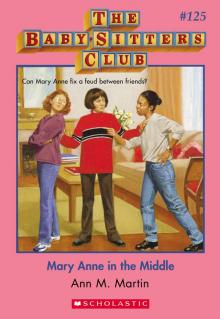 Mary Anne in the Middle
Mary Anne in the Middle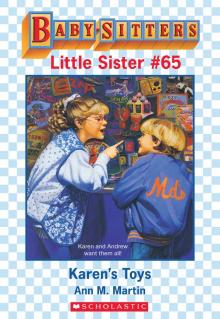 Karen's Toys
Karen's Toys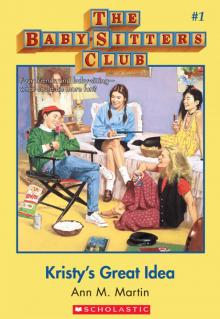 Kristy's Great Idea
Kristy's Great Idea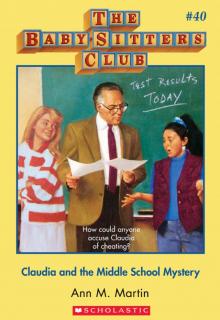 Claudia and the Middle School Mystery
Claudia and the Middle School Mystery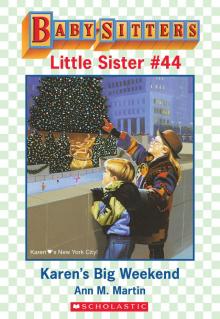 Karen's Big Weekend
Karen's Big Weekend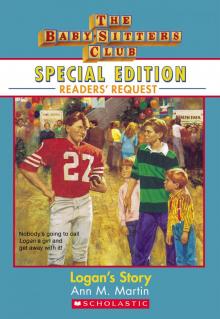 Logan's Story
Logan's Story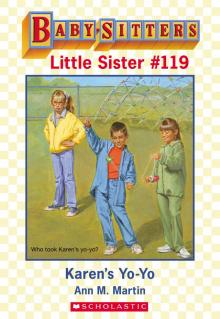 Karen's Yo-Yo
Karen's Yo-Yo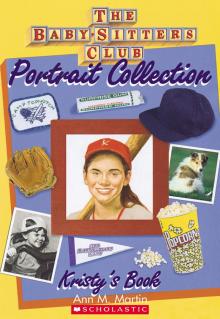 Kristy's Book
Kristy's Book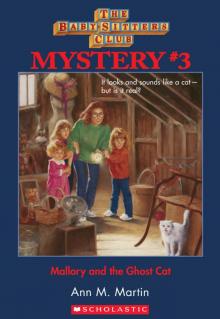 Mallory and the Ghost Cat
Mallory and the Ghost Cat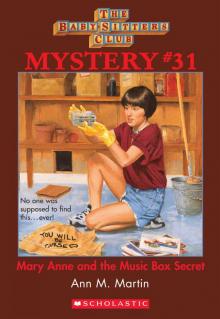 Mary Anne and the Music
Mary Anne and the Music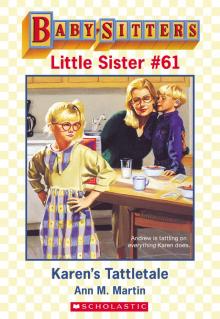 Karen's Tattletale
Karen's Tattletale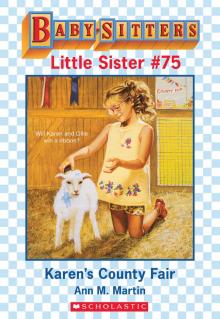 Karen's County Fair
Karen's County Fair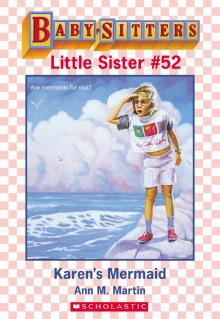 Karen's Mermaid
Karen's Mermaid Snowbound
Snowbound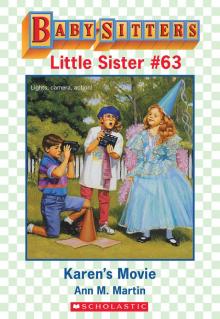 Karen's Movie
Karen's Movie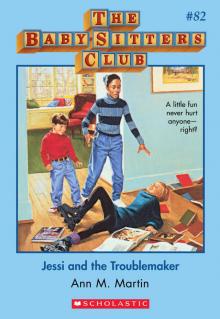 Jessi and the Troublemaker
Jessi and the Troublemaker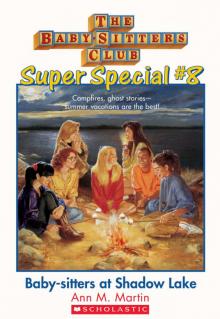 Baby-Sitters at Shadow Lake
Baby-Sitters at Shadow Lake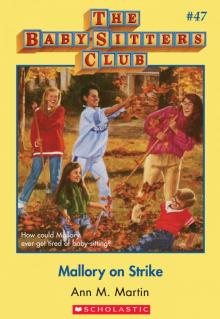 Mallory on Strike
Mallory on Strike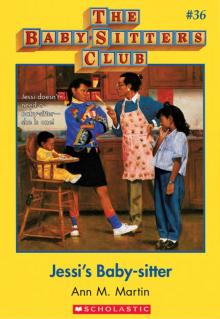 Jessi's Baby-Sitter
Jessi's Baby-Sitter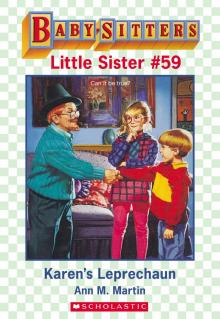 Karen's Leprechaun
Karen's Leprechaun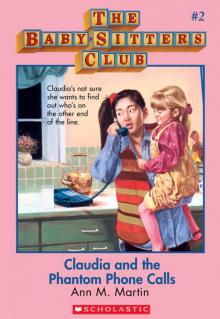 Claudia and the Phantom Phone Calls
Claudia and the Phantom Phone Calls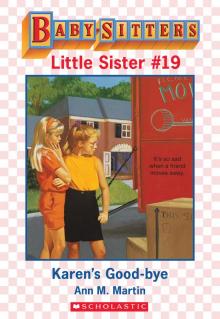 Karen's Good-Bye
Karen's Good-Bye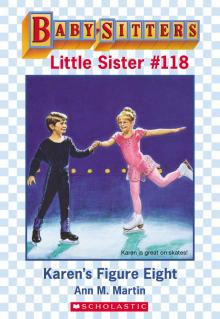 Karen's Figure Eight
Karen's Figure Eight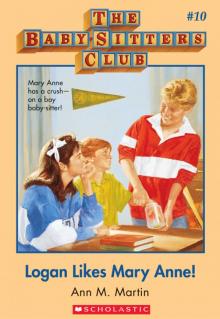 Logan Likes Mary Anne!
Logan Likes Mary Anne! Mary Anne and the Zoo Mystery
Mary Anne and the Zoo Mystery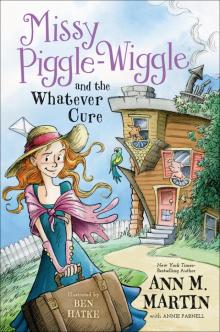 Missy Piggle-Wiggle and the Whatever Cure
Missy Piggle-Wiggle and the Whatever Cure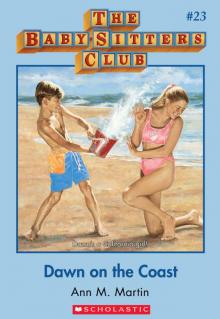 Dawn on the Coast
Dawn on the Coast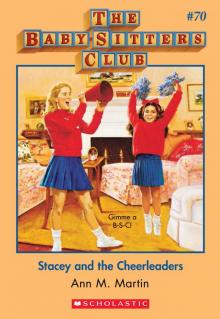 Stacey and the Cheerleaders
Stacey and the Cheerleaders Claudia and the Clue in the Photograph
Claudia and the Clue in the Photograph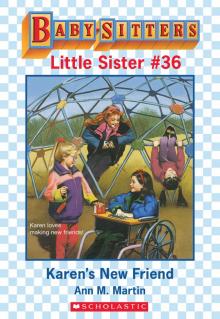 Karen's New Friend
Karen's New Friend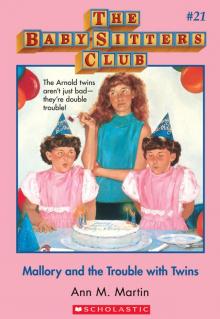 Mallory and the Trouble With Twins
Mallory and the Trouble With Twins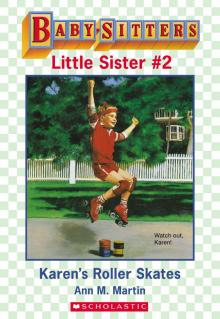 Karen's Roller Skates
Karen's Roller Skates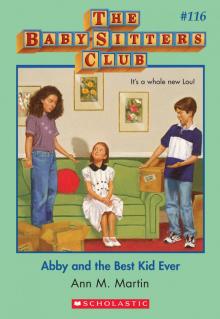 Abby and the Best Kid Ever
Abby and the Best Kid Ever Poor Mallory!
Poor Mallory!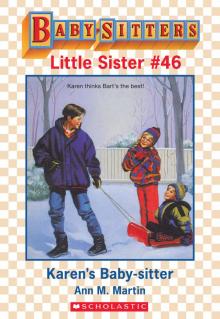 Karen's Witch
Karen's Witch Karen's Grandmothers
Karen's Grandmothers Slam Book
Slam Book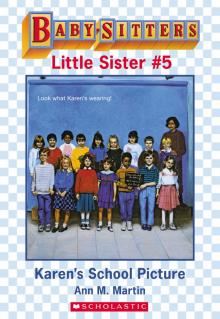 Karen's School Picture
Karen's School Picture Karen's Reindeer
Karen's Reindeer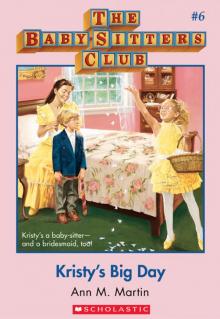 Kristy's Big Day
Kristy's Big Day The Long Way Home
The Long Way Home Karen's Sleigh Ride
Karen's Sleigh Ride On Christmas Eve
On Christmas Eve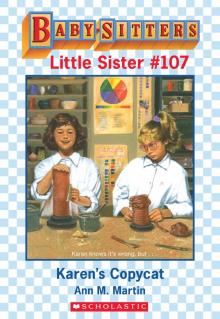 Karen's Copycat
Karen's Copycat Karen's Ice Skates
Karen's Ice Skates Claudia and the Little Liar
Claudia and the Little Liar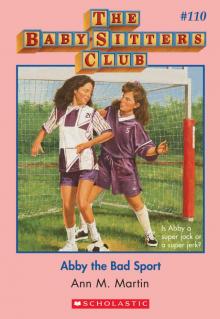 Abby the Bad Sport
Abby the Bad Sport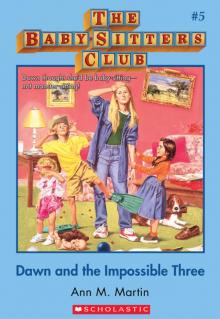 The Baby-Sitters Club #5: Dawn and the Impossible Three
The Baby-Sitters Club #5: Dawn and the Impossible Three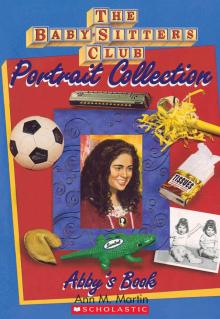 Abby's Book
Abby's Book Karen's Big Top
Karen's Big Top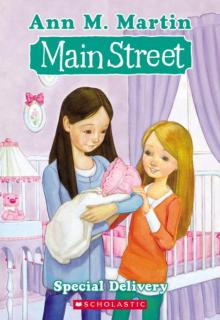 Main Street #8: Special Delivery
Main Street #8: Special Delivery Kristy and the Kidnapper
Kristy and the Kidnapper Karen's Ski Trip
Karen's Ski Trip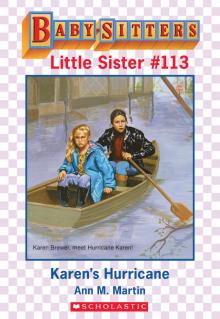 Karen's Hurricane
Karen's Hurricane Stacey and the Mystery at the Mall
Stacey and the Mystery at the Mall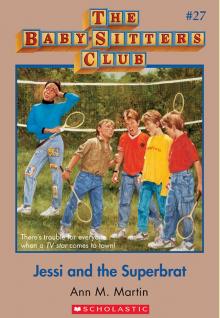 Jessi and the Superbrat
Jessi and the Superbrat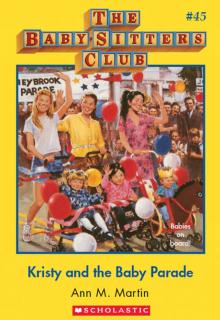 Kristy and the Baby Parade
Kristy and the Baby Parade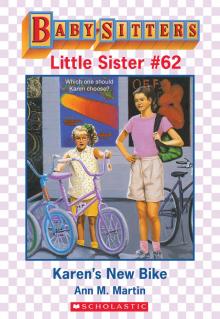 Karen's New Bike
Karen's New Bike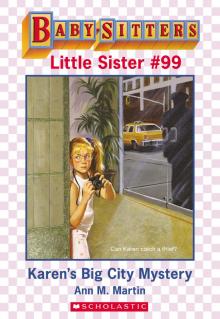 Karen's Big City Mystery
Karen's Big City Mystery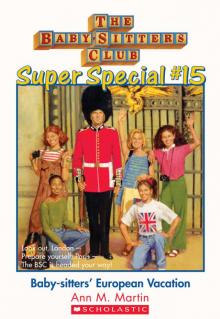 Baby-Sitters' European Vacation
Baby-Sitters' European Vacation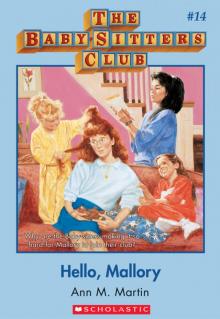 Hello, Mallory
Hello, Mallory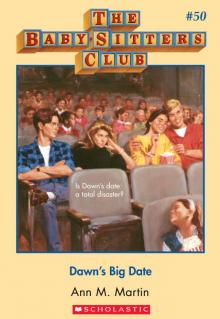 Dawn's Big Date
Dawn's Big Date Karen's Christmas Carol
Karen's Christmas Carol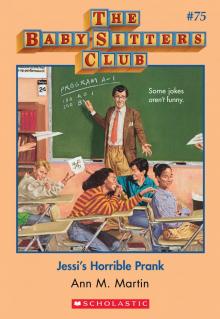 Jessi's Horrible Prank
Jessi's Horrible Prank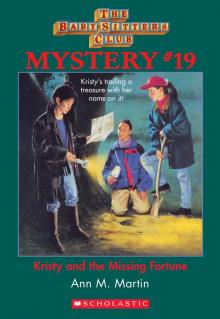 Kristy and the Missing Fortune
Kristy and the Missing Fortune Kristy and the Haunted Mansion
Kristy and the Haunted Mansion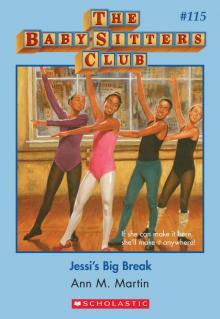 Jessi's Big Break
Jessi's Big Break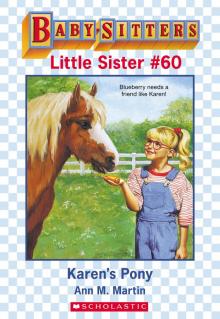 Karen's Pony
Karen's Pony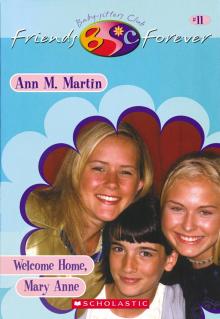 Welcome Home, Mary Anne
Welcome Home, Mary Anne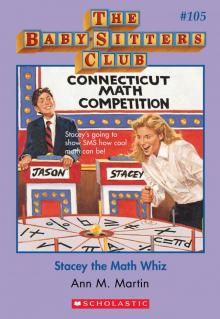 Stacey the Math Whiz
Stacey the Math Whiz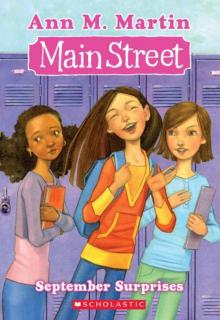 September Surprises
September Surprises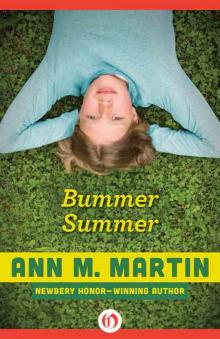 Bummer Summer
Bummer Summer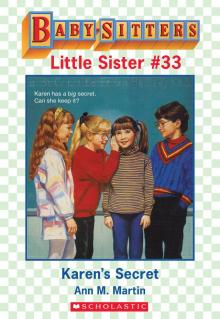 Karen's Secret
Karen's Secret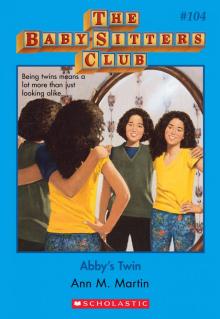 Abby's Twin
Abby's Twin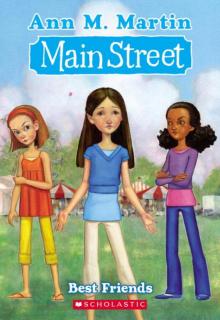 Main Street #4: Best Friends
Main Street #4: Best Friends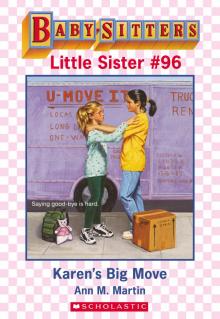 Karen's Big Move
Karen's Big Move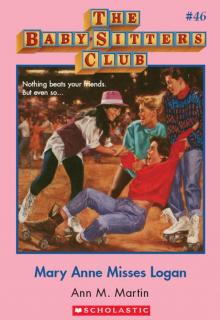 Mary Anne Misses Logan
Mary Anne Misses Logan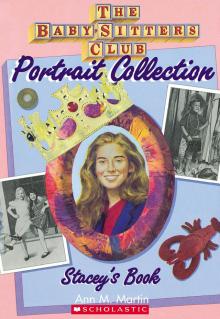 Stacey's Book
Stacey's Book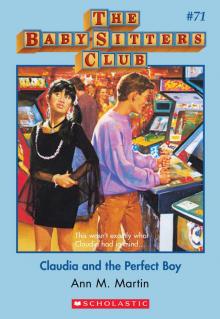 Claudia and the Perfect Boy
Claudia and the Perfect Boy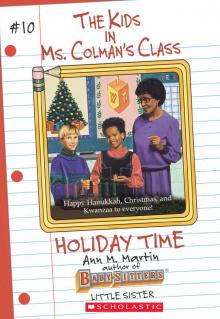 Holiday Time
Holiday Time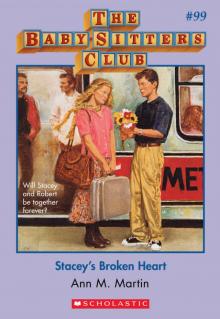 Stacey's Broken Heart
Stacey's Broken Heart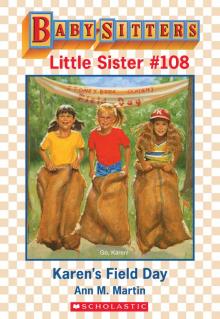 Karen's Field Day
Karen's Field Day Kristy's Worst Idea
Kristy's Worst Idea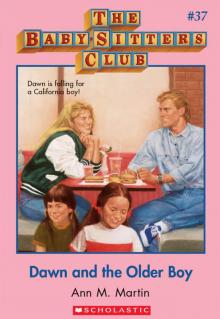 Dawn and the Older Boy
Dawn and the Older Boy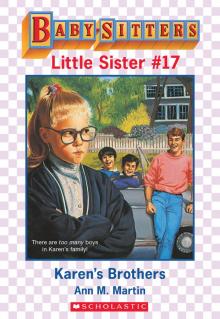 Karen's Brothers
Karen's Brothers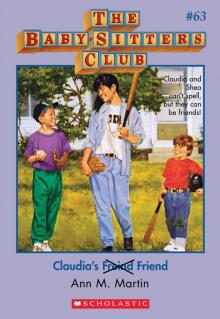 Claudia's Friend
Claudia's Friend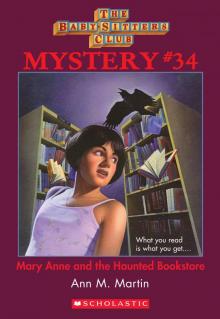 Mary Anne and the Haunted Bookstore
Mary Anne and the Haunted Bookstore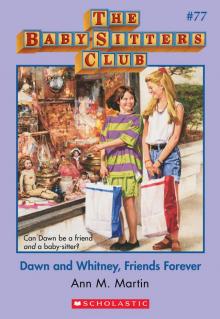 Dawn and Whitney, Friends Forever
Dawn and Whitney, Friends Forever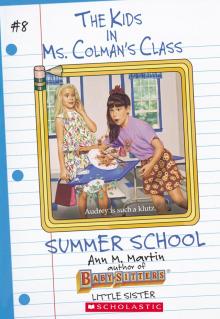 Summer School
Summer School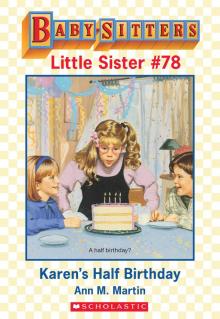 Karen's Birthday
Karen's Birthday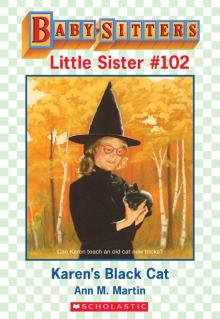 Karen's Black Cat
Karen's Black Cat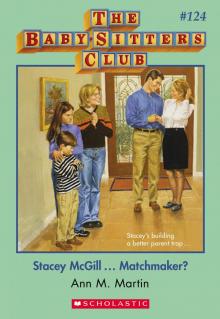 Stacey McGill... Matchmaker?
Stacey McGill... Matchmaker? Claudia's Book
Claudia's Book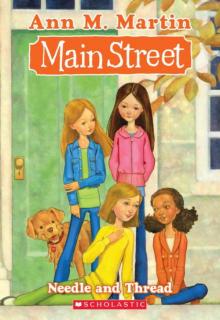 Main Street #2: Needle and Thread
Main Street #2: Needle and Thread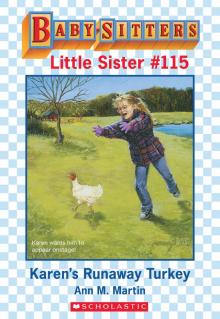 Karen's Runaway Turkey
Karen's Runaway Turkey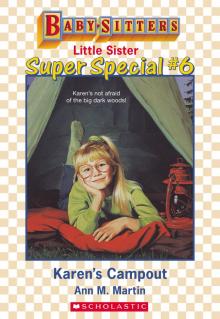 Karen's Campout
Karen's Campout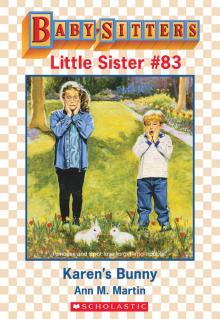 Karen's Bunny
Karen's Bunny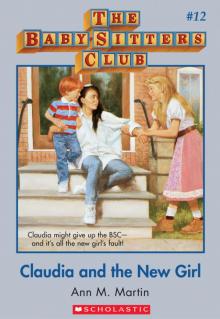 Claudia and the New Girl
Claudia and the New Girl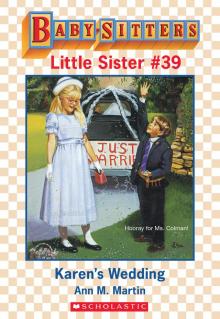 Karen's Wedding
Karen's Wedding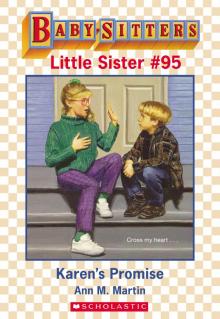 Karen's Promise
Karen's Promise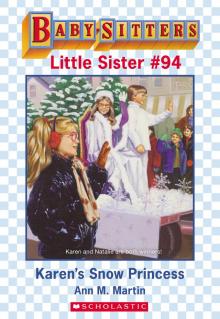 Karen's Snow Princess
Karen's Snow Princess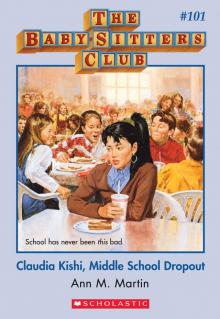 Claudia Kishi, Middle School Dropout
Claudia Kishi, Middle School Dropout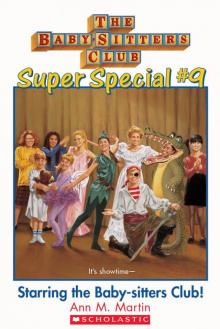 Starring the Baby-Sitters Club!
Starring the Baby-Sitters Club!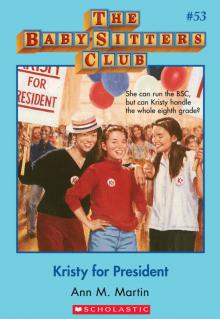 Kristy for President
Kristy for President California Girls!
California Girls!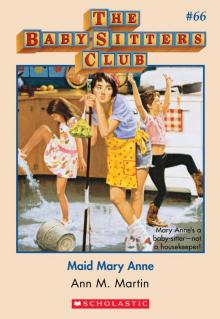 Maid Mary Anne
Maid Mary Anne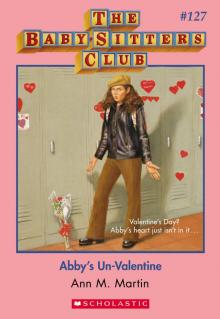 Abby's Un-Valentine
Abby's Un-Valentine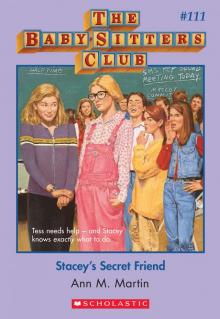 Stacey's Secret Friend
Stacey's Secret Friend Karen's Haunted House
Karen's Haunted House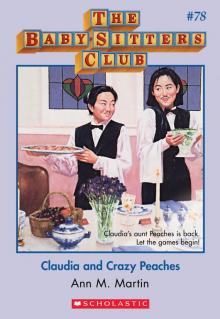 Claudia and Crazy Peaches
Claudia and Crazy Peaches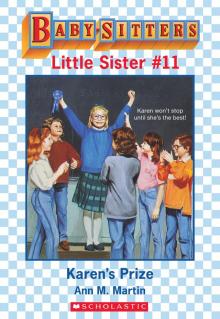 Karen's Prize
Karen's Prize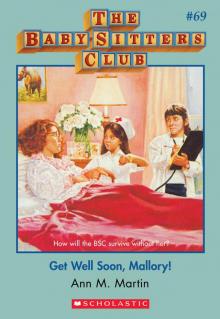 Get Well Soon, Mallory!
Get Well Soon, Mallory!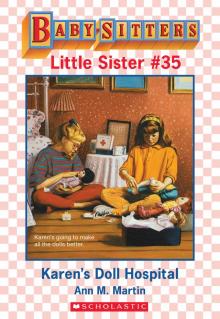 Karen's Doll Hospital
Karen's Doll Hospital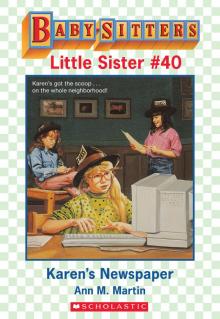 Karen's Newspaper
Karen's Newspaper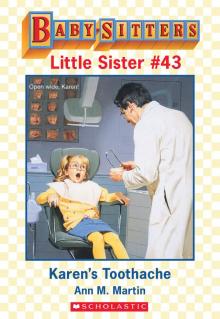 Karen's Toothache
Karen's Toothache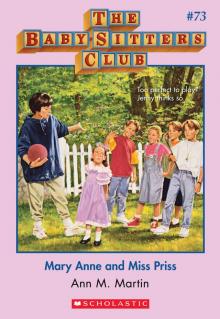 Mary Anne and Miss Priss
Mary Anne and Miss Priss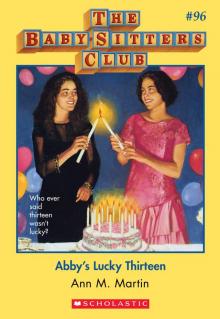 Abby's Lucky Thirteen
Abby's Lucky Thirteen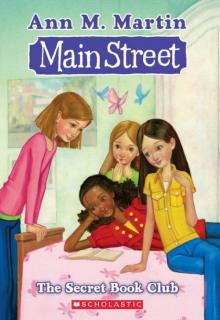 The Secret Book Club
The Secret Book Club The All-New Mallory Pike
The All-New Mallory Pike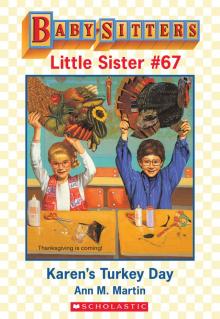 Karen's Turkey Day
Karen's Turkey Day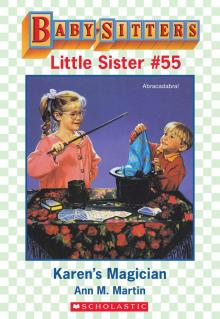 Karen's Magician
Karen's Magician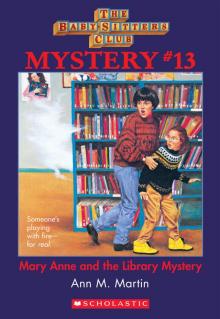 Mary Anne and the Library Mystery
Mary Anne and the Library Mystery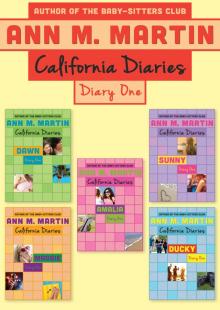 Diary One: Dawn, Sunny, Maggie, Amalia, and Ducky
Diary One: Dawn, Sunny, Maggie, Amalia, and Ducky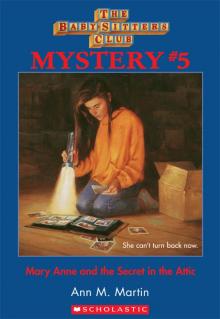 Mary Anne and the Secret in the Attic
Mary Anne and the Secret in the Attic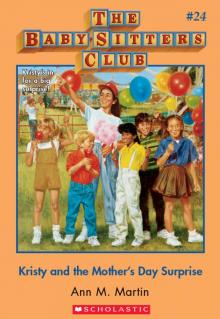 Kristy and the Mother's Day Surprise
Kristy and the Mother's Day Surprise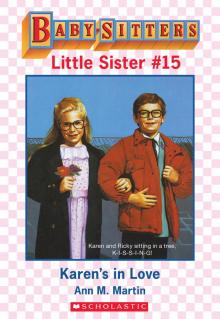 Karen's in Love
Karen's in Love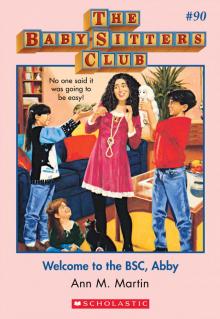 Welcome to the BSC, Abby
Welcome to the BSC, Abby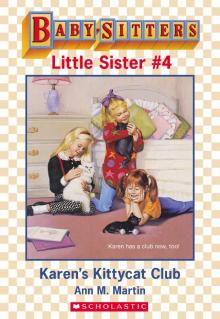 Karen's Kittycat Club
Karen's Kittycat Club The Mystery at Claudia's House
The Mystery at Claudia's House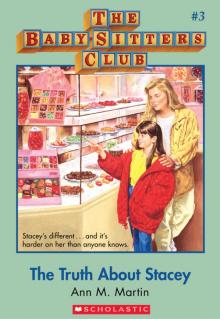 The Truth About Stacey
The Truth About Stacey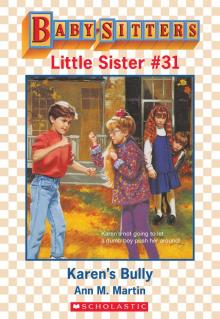 Karen's Bully
Karen's Bully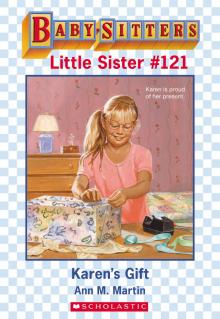 Karen's Gift
Karen's Gift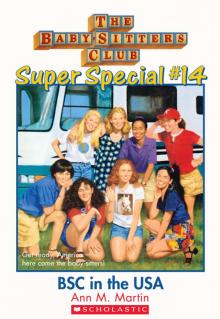 BSC in the USA
BSC in the USA Everything for a Dog
Everything for a Dog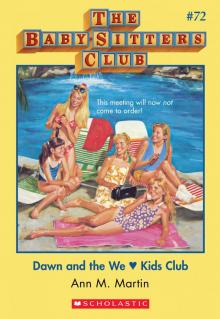 Dawn and the We Love Kids Club
Dawn and the We Love Kids Club Karen's Ghost
Karen's Ghost Stacey's Lie
Stacey's Lie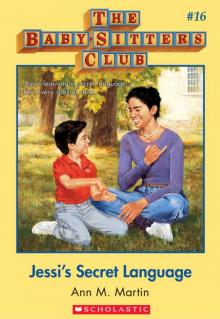 Jessi's Secret Language
Jessi's Secret Language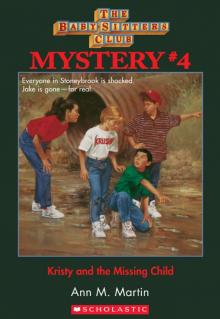 Kristy and the Missing Child
Kristy and the Missing Child Better to Wish
Better to Wish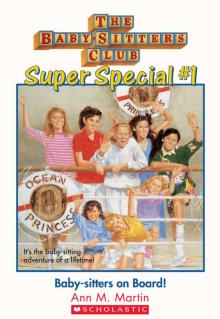 Baby-Sitters on Board!
Baby-Sitters on Board!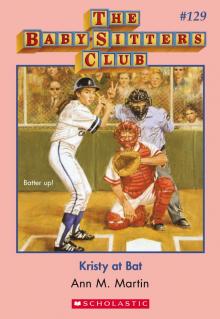 Kristy at Bat
Kristy at Bat Everything Changes
Everything Changes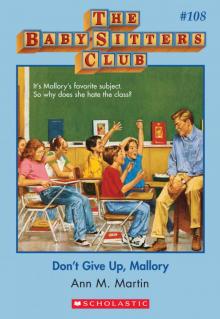 Don't Give Up, Mallory
Don't Give Up, Mallory A Dog's Life: The Autobiography of a Stray
A Dog's Life: The Autobiography of a Stray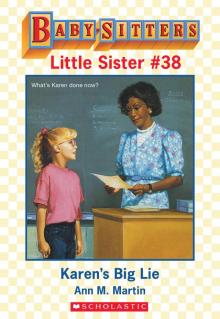 Karen's Big Lie
Karen's Big Lie Karen's Show and Share
Karen's Show and Share Mallory Hates Boys (and Gym)
Mallory Hates Boys (and Gym) Diary Two: Dawn, Sunny, Maggie, Amalia, and Ducky
Diary Two: Dawn, Sunny, Maggie, Amalia, and Ducky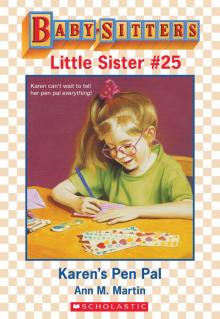 Karen's Pen Pal
Karen's Pen Pal Claudia and the Friendship Feud
Claudia and the Friendship Feud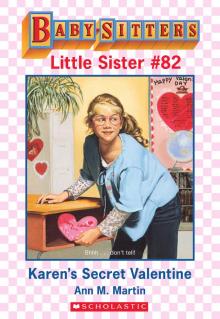 Karen's Secret Valentine
Karen's Secret Valentine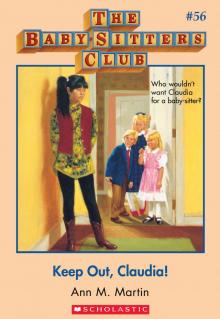 Keep Out, Claudia!
Keep Out, Claudia! Aloha, Baby-Sitters!
Aloha, Baby-Sitters!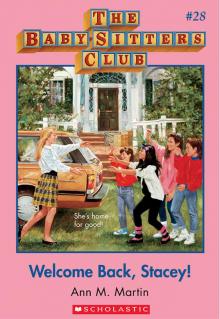 Welcome Back, Stacey
Welcome Back, Stacey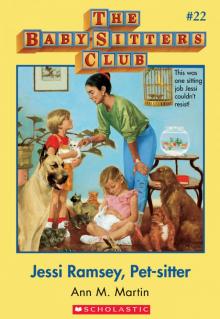 Jessi Ramsey, Pet-Sitter
Jessi Ramsey, Pet-Sitter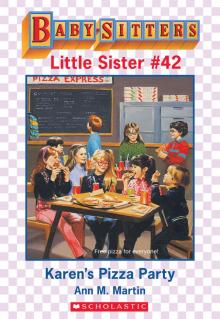 Karen's Pizza Party
Karen's Pizza Party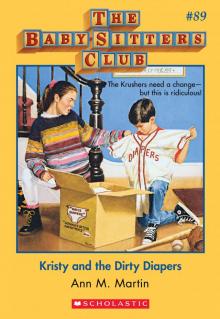 Kristy and the Dirty Diapers
Kristy and the Dirty Diapers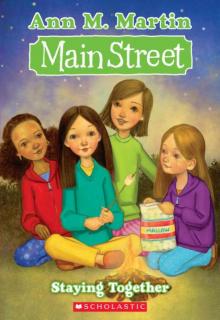 Staying Together
Staying Together Dawn and the Surfer Ghost
Dawn and the Surfer Ghost Claudia Makes Up Her Mind
Claudia Makes Up Her Mind Jessi's Gold Medal
Jessi's Gold Medal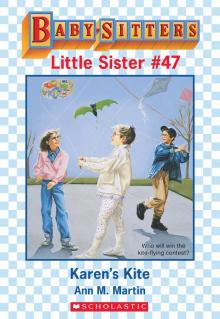 Karen's Kite
Karen's Kite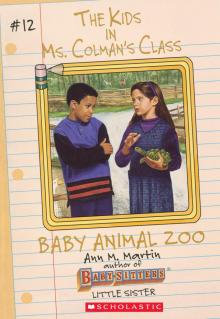 Baby Animal Zoo
Baby Animal Zoo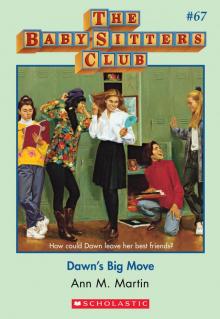 Dawn's Big Move
Dawn's Big Move Karen's Big Joke
Karen's Big Joke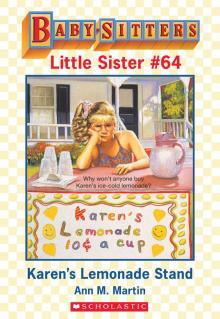 Karen's Lemonade Stand
Karen's Lemonade Stand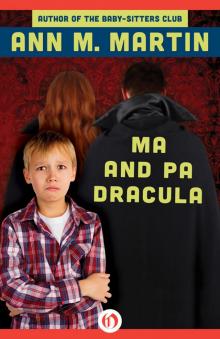 Ma and Pa Dracula
Ma and Pa Dracula Baby-Sitters' Haunted House
Baby-Sitters' Haunted House Abby and the Mystery Baby
Abby and the Mystery Baby Home Is the Place
Home Is the Place Karen's Grandad
Karen's Grandad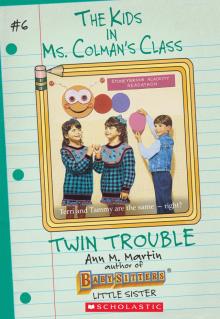 Twin Trouble
Twin Trouble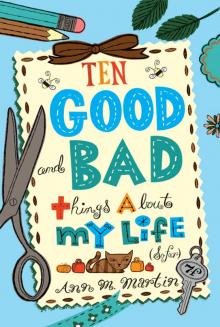 Ten Good and Bad Things About My Life (So Far)
Ten Good and Bad Things About My Life (So Far) Diary Two
Diary Two Baby-Sitters Club 027
Baby-Sitters Club 027 Claudia and the Mystery Painting
Claudia and the Mystery Painting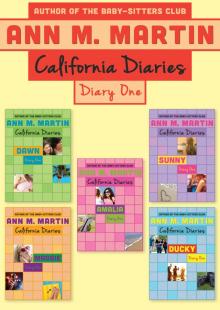 Diary One
Diary One Baby-Sitters Club 037
Baby-Sitters Club 037 Baby-Sitters Club 028
Baby-Sitters Club 028 Baby-Sitters Club 085
Baby-Sitters Club 085 Dawn Schaffer Undercover Baby-Sitter
Dawn Schaffer Undercover Baby-Sitter Jessi's Babysitter
Jessi's Babysitter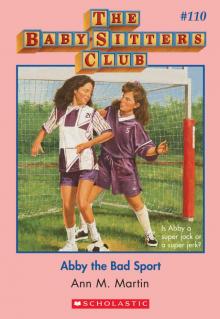 The Baby-Sitters Club #110: Abby the Bad Sport (Baby-Sitters Club, The)
The Baby-Sitters Club #110: Abby the Bad Sport (Baby-Sitters Club, The) Karen's Little Sister
Karen's Little Sister Baby-Sitters Club 058
Baby-Sitters Club 058 Claudia And The Genius On Elm St.
Claudia And The Genius On Elm St. Missy Piggle-Wiggle and the Sticky-Fingers Cure
Missy Piggle-Wiggle and the Sticky-Fingers Cure Kristy and Kidnapper
Kristy and Kidnapper Baby-Sitters Club 041
Baby-Sitters Club 041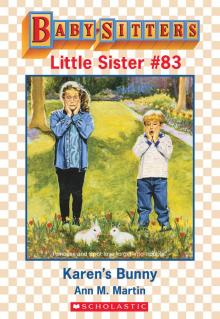 Karen's Bunny Trouble
Karen's Bunny Trouble Baby-Sitters Club 032
Baby-Sitters Club 032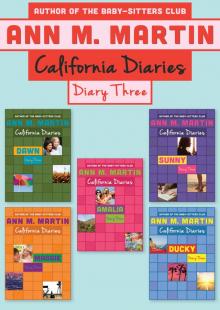 Diary Three
Diary Three Christmas Chiller
Christmas Chiller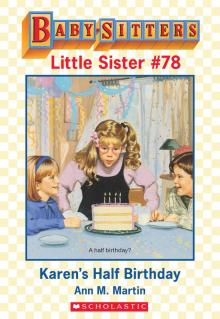 Karen's Half-Birthday
Karen's Half-Birthday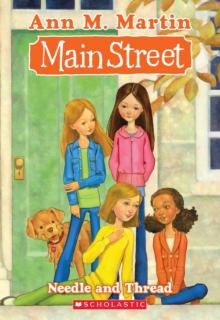 Needle and Thread
Needle and Thread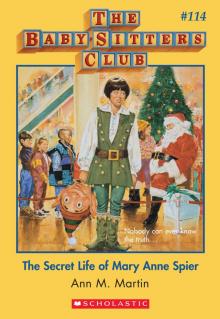 Secret Life of Mary Anne Spier
Secret Life of Mary Anne Spier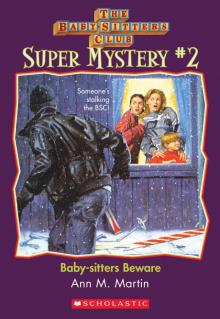 Baby-Sitters Beware
Baby-Sitters Beware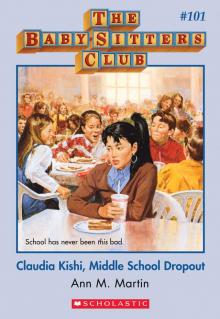 Claudia Kishi, Middle School Drop-Out
Claudia Kishi, Middle School Drop-Out Logan Likes Mary Anne !
Logan Likes Mary Anne ! Baby-Sitters Club 061
Baby-Sitters Club 061 Best Friends
Best Friends Baby-Sitters Club 031
Baby-Sitters Club 031 Karen's Little Witch
Karen's Little Witch Jessi Ramsey, Petsitter
Jessi Ramsey, Petsitter Baby-Sitters Club 123
Baby-Sitters Club 123 Baby-Sitters Club 059
Baby-Sitters Club 059 Baby-Sitters Club 033
Baby-Sitters Club 033 Baby-Sitters Club 060
Baby-Sitters Club 060 Baby-Sitters Club 094
Baby-Sitters Club 094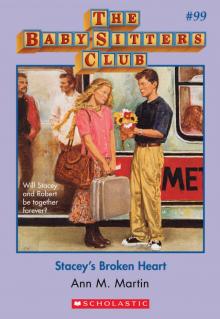 The Baby-Sitters Club #99: Stacey's Broken Heart
The Baby-Sitters Club #99: Stacey's Broken Heart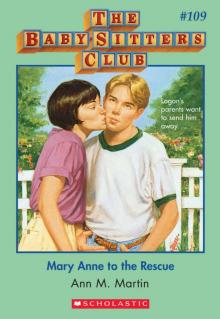 The Baby-Sitters Club #109: Mary Anne to the Rescue (Baby-Sitters Club, The)
The Baby-Sitters Club #109: Mary Anne to the Rescue (Baby-Sitters Club, The) Mystery At Claudia's House
Mystery At Claudia's House Claudia And The Sad Goodbye
Claudia And The Sad Goodbye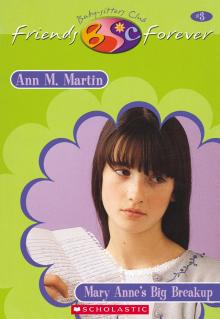 Mary Anne's Big Break-Up
Mary Anne's Big Break-Up Baby-Sitters Club 025
Baby-Sitters Club 025 Baby-Sitters Club 042
Baby-Sitters Club 042 Stacey and the Mystery of the Empty House
Stacey and the Mystery of the Empty House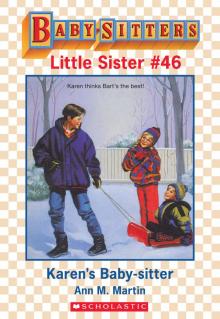 Karen's Baby-Sitter
Karen's Baby-Sitter Claudia's Friendship Feud
Claudia's Friendship Feud Baby-Sitters Club 090
Baby-Sitters Club 090 Baby-Sitters Club 021
Baby-Sitters Club 021 Baby-Sitters Club 056
Baby-Sitters Club 056 Baby-Sitters Club 040
Baby-Sitters Club 040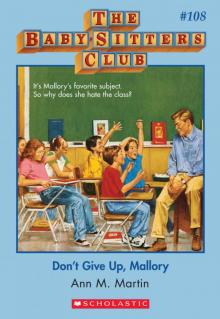 The Baby-Sitters Club #108: Don't Give Up, Mallory (Baby-Sitters Club, The)
The Baby-Sitters Club #108: Don't Give Up, Mallory (Baby-Sitters Club, The)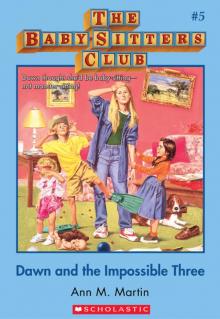 Dawn and the Impossible Three
Dawn and the Impossible Three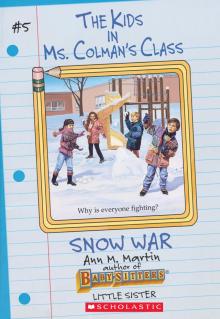 The Snow War
The Snow War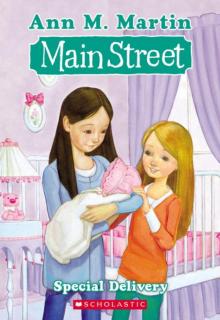 Special Delivery
Special Delivery Baby-Sitters Club 057
Baby-Sitters Club 057 Mary Anne And Too Many Babies
Mary Anne And Too Many Babies Baby-Sitters Club 030
Baby-Sitters Club 030